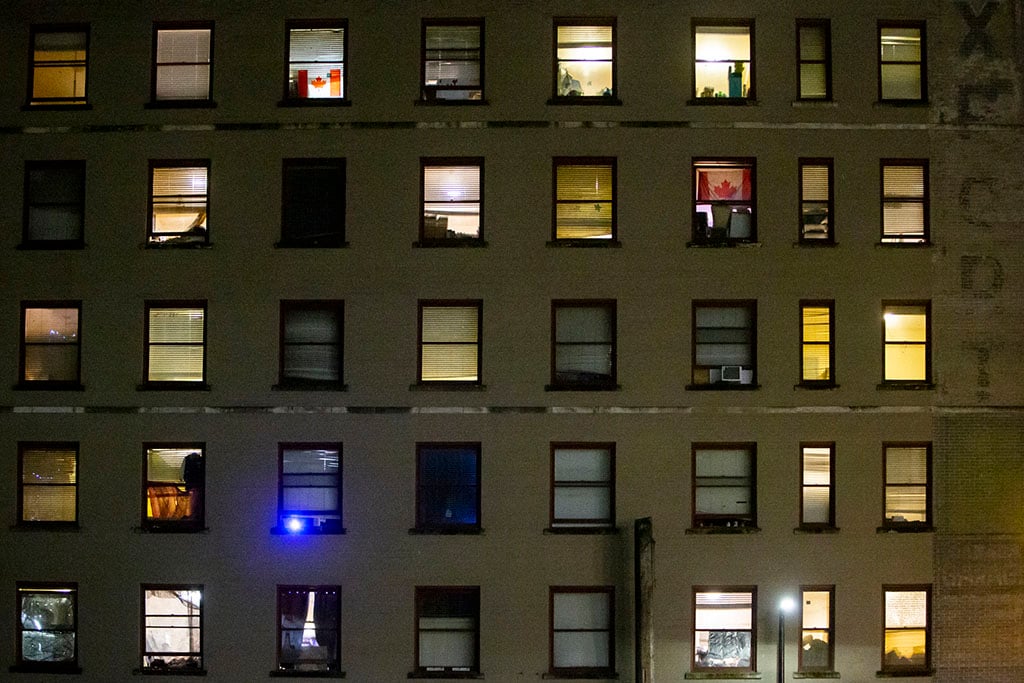Staff at a property management company that operates some of Vancouver’s most challenging supportive housing buildings frequently work alone and do not feel safe at work, according to a survey conducted by their union.
The survey follows reporting by The Tyee that examined workplace safety concerns at single-room occupancy hotels operated by Atira Property Management Inc. Eight current and former staff told The Tyee about working alone in the buildings, where assaults occur frequently and staff are expected to respond to overdoses and other emergencies, such as tenants setting fires in their rooms.
Atira Property Management Inc. is a for-profit subsidiary of Atira Women’s Resource Society. AWRS operates transition houses and supportive housing for women, while APMI is a property management company that manages strata and apartment buildings, as well as 20 SRO buildings in Vancouver.
Most of the APMI-operated SROs receive funding from BC Housing and offer some form of supportive housing, and some are owned by the provincial government.
SROs are hotels built in the early 20th century that have small rooms and shared bathrooms, and most SROs in Vancouver are located in the Downtown Eastside and other parts of downtown. The buildings are often referred to as the housing of last resort for people who cannot get housing anywhere else.
The BC General Employees' Union represents 300 APMI workers, and about one-third of workers responded to the survey. The union says the survey was not sent to all workers because union representatives don’t have email addresses for everyone. The survey results obtained by The Tyee are dated Nov. 2.
The results show that 40 per cent of the workers who responded to the survey said they had been forced to work alone more than once a week after a co-worker did not show up or management did not staff an empty shift. The union called the 40-per-cent figure “shocking.”
According to the survey, 42 per cent of respondents had not been trained on working alone procedures, and 66 per cent of the workers who had been trained said it doesn’t go far enough to keep people safe.
The survey showed that 80 per cent of respondents thought the employer could be doing more to improve safety, and 71 per cent thought that ensuring there were no empty shifts would be a “very effective” way to improve safety.
Since January 2020, there have been four homicides at SROs operated by APMI. During one of those incidents, a building staffer who was working alone had to try to fend off an assailant and provide first aid to one of the two victims of a stabbing.
The employees who spoke to The Tyee also said that staff are not adequately trained for the complex situations they encounter and are paid less than staff at other organizations that run supportive housing in the Downtown Eastside.
The Tyee showed the survey results to Jennifer Hall Russell, a former APMI employee.
“I can’t imagine how anyone would feel safe in that job,” Hall Russell said. “I don’t think I was ever told anything about [the working alone procedure]. I was told you never work alone, but I did, I worked alone all the time.”
Hall Russell said she often felt unsafe while she was working on her own and was shoved a couple of times while alone. She said it was good to see the union take this step to gather information about how many workers have safety concerns.
“Having an accounting of how many people are feeling uncomfortable at work is a good thing, and that can be a jumping off point for grievances and policy changes,” said Hall Russell, who is no longer a member of the union.
A spokesperson from the BCGEU said the union frequently does surveys like this to get information about workplace issues that are affecting members. The surveys can then be used to work with the employer to improve workplace issues that may be affecting staff morale and safety.
According to the survey, 63 per cent of workers who responded to the survey would like more training and education on their rights as workers. They listed non-violent intervention and de-escalation, self-defence, basic health and safety and first aid, mental health training, working alone and emergency training as areas they’d like to be better trained in.
In previous interviews, the CEO of Atira Women’s Resources Society and Atira Property Management Inc., Janice Abbott, has said that her organization has now developed new training for APMI employees.
The Tyee contacted Atira Property Management Inc. by email and telephone to comment on this story but did not receive a response. ![]()
Read more: Rights + Justice, Labour + Industry, Housing
















Tyee Commenting Guidelines
Comments that violate guidelines risk being deleted, and violations may result in a temporary or permanent user ban. Maintain the spirit of good conversation to stay in the discussion.
*Please note The Tyee is not a forum for spreading misinformation about COVID-19, denying its existence or minimizing its risk to public health.
Do:
Do not: